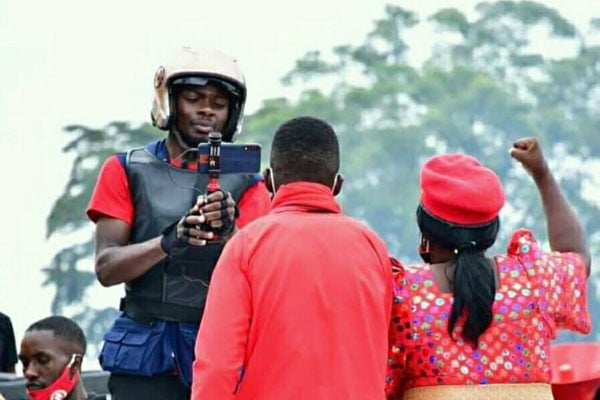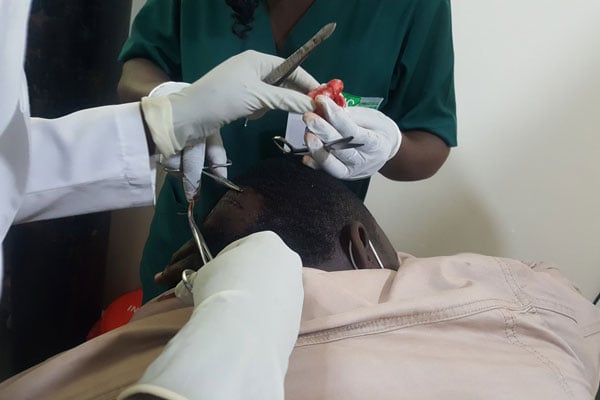Prime
Ashraf Kasirye: The making of a daredevil journalist

Kasirye atop a vehicle while doing live coverage for NUP-leaning Ghetto TV. PHOTO/INTERNET
What you need to know:
- Resilient. Ashraf Kasirye aspired to be a Roman Catholic priest, but he took a plunge to pursue his passion, journalism.
- Today, Kasirye turns 30 and he feels so lucky to be alive, because just 20 days to his 29th birthday the journalist, who became famous for fearlessly covering Robert Kyagulanyi presidential campaigns, was feared dead, writes Abdul-Nasser Ssemugabi.
Today is Ashraf Kasirye’s 30th birthday. But he feels so lucky to be alive, because just 20 days to his 29th the journalist, who became famous for fearlessly covering Robert Kyagulanyi’s chaotic presidential campaigns, was feared dead.
For going where others fear, Kasirye suffered several attacks by the security and anti-riot operatives but he nearly died on December 27, 2020 after being hit on the head by an object that some thought was a bullet, but police called a teargas canister.
Kasirye says the wounds are not yet healed. He no longer wears his neat haircut. His hair is curling into dreadlocks because he wraps his head in a headgear to protect his skull against direct sunlight, wind and sound. He says he will undergo another surgery.
“When I see mentally ill people I thank God that He saved me from being like them; I recovered all my senses, though sometimes I forget people’s names,” Kasirye says, smiling.
Sylvester to Ashraf
Born on January 16, 1992, in Nyenga, Buikwe District, Kasirye is the last-born of John Chrysostom Kiwanuka Mbuga, a catholic and Hamida Gwokyalya, a Muslim.
He started education in 1997 at St Jude Primary School, then Green Valley Primary School in Mbikko, which his father thought had better standards, where he finished primary level.
“For Senior One, my father took me to Nyenga Seminary because he wanted me to be a priest.”
But his father was involved in a motor accident and spent most of his money on treatment. Everything changed.
“So he took me to St Noa Mawaggali SSS, another Catholic school on the Nile, which was cheaper.”
Rev Fr Wijnand Huys, a Mill Hill missionary, was the parish priest of St Kalooli Lwanga Mbikko Parish as well the managing director of the school.
Kasirye joined the school band, for the love of music. For mastering the saxophone and clarinet, within just six months, he earned a bursary through to A-Level.
Kasirye’s mother died in 2004. Meanwhile, he had heard a lot about her relationship with his father and always wanted to pray for her in a special way.
“My Catholic friend told me it was okay, but a Muslim friend told me I couldn’t unless I became a Muslim because my mother died a Muslim.
“That’s how I converted in 2007 when I was in Senior Three.”
Kasirye even observed Ramadhan that year, but fearing his father’s wrath, he kept his spiritual defection a secret. Then came Idd and his father wanted his family in the garden. But Kasirye escaped to the mosque for prayers and to a friend’s home for the feast.
In the evening, canes awaited him.
“That’s when I told my father that I converted to my mother’s religion.
“Infuriated, he said: ‘I can’t punish you. Ewaffe tetuzaala Basiraamu’ (In our family we don’t bear Muslims)…he chased me out of the house.”
Kasirye spent the night in their kitchen.
“In the morning, he asked me: are you still a Muslim? I said yes. He excommunicated me. I’ve never gone back.”

Fr Wijnand Huys gives a young Kasirye a certificate for essay writing. PHOTO/COURTESY
His father even asked the school to cancel the bursary, but Fr Huys could not punish his gifted ‘child’. (At Green Valley PS, the cleric had awarded Kasirye a certificate for writing a Catholic essay). Now, he told Kasirye’s father that the bursary was based on band performance, not religion.
For prayers and Islamic studies, Kasirye went to a nearby mosque and returned to the band to play church music.
“I had no choice and I love music [though Islam discourages music]. God knows...”
After O-Level, he was circumcised and Sylvester became Ashraf.
First, he lived with friends in Mbikko. Soon, he rented a room for Shs20,000 a month and washed cars for survival.
“Sometimes I failed to go to school but my friends helped me with notes and discussion.
I also dropped all science subjects, though somehow, at O-Level I scored eight in mathematics.”
The hustle
After A-Level, Kasirye lived in Nansana with his brother Paul Tebaasoboke, who wanted him to learn auto mechanics, an offer he was hesitant to embrace.
“Towards the end of 2011, the school band master called to tell us that Fr Huys, who had returned to The Netherlands, had offered to sponsor needy outgoing members for diploma courses. I celebrated because journalism was my only passion.”
Kasirye did a diploma in journalism at Uganda Film and Television Institute in Rubaga. During his internship at Super FM in 2013, Kenneth Lukwago, a neighbour, got him a job at Radio One.

Leader of Opposition in Parliament Mathias Mpuuga (left) serves cake to Kasirye (R) at NUP end-of-year dinner. PHOTO/INTERNET.
As a freelance reporter earning Shs5,500 for a story, he rode a bicycle to cover Wakiso and areas around Kampala, building a reliable pool of sources, including politicians, vendors, administrators, and police.
One day he rode 143km to Luweero but the Shs50,000 token from the event organisers meant a lot for a man who had only Shs5,000 on him.
In late 2013, Kasirye joined Vision Group, as a freelance reporter for radio, TV, print and digital platforms.
And here, a radio story was paid Shs4,200 and if used on XFM and Bukedde Radio it could be paid twice.
But he kept his loyalty to his first employer.
“Radio One allowed me to send them only soundbites; they didn’t want to limit a freelancer.”
Kasirye’s first Vision assignment was covering land wrangles in which Kasokoso residents mobbed Mayor Mamerito Mugerwa, suspecting him of influencing their pending eviction by National Housing and Construction Company.
Kasirye says Metropolitan Police commander Andrew Felix Kaweesi (RIP) narrowly survived death as one of the rioters grabbed his gun when he attempted to stop the mob from beating Mugerwa.
Kasirye’s brother had given him a simple camera, with which he took photos at Uganda Film and Television Institute and in Nansana, for a fee. Now he used it for even shooting videos such as when rioters set Mugerwa’s car ablaze, his first-ever TV story.
“In the field, I shot videos, took pictures, recorded soundbites and wrote for the paper and digital platforms to boost my story count and pay.”
Chased from NRM camp
To improve his online coverage, in 2015 Kasirye bought a used iPhone at Shs600,000 from his editor. He covered the NRM delegates’ conference at Namboole Stadium, ahead of the 2016 general elections, earning Shs50,000 per day.

President Museveni and Ashraf Kasirye in the past.
He also covered Museveni’s campaign trail, under the team named Media One. The team that comprised reporters from different media houses moved in a special vehicle.
The allowances tripled to Shs150,000 per day. On the trail, Kasirye remembers Museveni’s car failing on the way to Sironko and had to be pushed out of the mud on a bad road.
He says Museveni was not in the car and reached the rally venue by helicopter. But reporters were not allowed to do ‘negative’ stories.
“I felt these were big stories but we had to toe the line.
Off-duty, the journalists would express their political views and affiliations. Kasirye says he was nonpartisan, though some say, he was a Museveni fan.
As Museveni wound up his campaigns in the west, he addressed the press at the state lodge in Kabale, as he did in other regions. Kasirye says the unwritten rule was that nobody asked the President questions that had not been passed by the media coordinator. (However, another journalist says the only restriction he remembers was about asking questions relevant to the trail in a particular region).
Still, Kasirye bent the rules. He had previously caught the President’s attention due to his diminutive stature, sense of style—thick beard and trousers cut above the ankles—and appetite to ask the big man questions.
Red Pepper’s John Batanudde, now at Daily Monitor, recalls Museveni jokingly calling Kasirye omutujju (terrorist).
Museveni could even ask “where’s Ashraf, ask your question.”
Kasirye once held Museveni’s palm and asked him why his finger was swollen.
Meanwhile, there were reports that Donald Trump was vowing that if elected US president, he would unseat dictators across the world. Kasirye asked about Museveni’s view of that.
“Museveni fumed. He said Americans should mind their own business. ‘They have failed to sort the rampant gun violence in their country…I’m seeking to be elected again, how am I a dictator?’”
Journalistically, Kasirye says, Museveni’s response was interesting. Immediately, he sent the online version of the story, which was uploaded instantly. The radio versions also aired immediately.
That would have been the most important question, perhaps on the entire campaign trail. But it sparked trepidation and uncertainty. In the evening, Kasirye received over six calls from Don Wanyama, who was like the media coordinator, and anonymous people who introduced themselves by military ranks. They all asked: how dare you ask questions that embarrass the President?
Kasirye says the online story was pulled down. (Another reporter told us they were told to “ignore the stuff”).
“A military woman told me ‘Ashraf you must leave our team…The President is unhappy. Your bosses will send another reporter.
“I feared. I called my wife and told her to pray that I don’t get detained, better they chase me. Even fellow journalists had started blaming me.”
The following morning, Kasirye watched Museveni’s rally from a distance, unsure what to do. Two soldiers, faces masked, picked him up.
“They took me to a Jeep. I thought I was under arrest…but I was innocent. They drove me to a military helicopter that flew me to Kololo Airstrip.
“Both soldiers got out, took me to one of the waiting black vehicles, sat either side of me and dropped me off at Vision offices. They never said anything except: sit, stand, out, go. They drove away, but never took anything away from me.
“That’s how I was chased from the NRM camp. But I was fine because I hadn’t done anything wrong. I was only doing my job.”
Wanyama, now Vision Group CEO, says he never worked for the NRM Secretariat that handled media issues on presidential campaigns.
“However, I recall one guy asking a really silly question based on a fake tweet attributed to Donald Trump then,” he wrote to us via WhatsApp. “I think his supervisors, embarrassed by the ignorance of their reporter, chose to recall him.”
The following day Kasirye was sent to cover the Forum for Democratic Change (FDC) camp in Fort Portal.
“But four days later, my editor called me saying NRM complained that I could leak their secrets to FDC.” Two days later, Kasirye returned to Kampala.
He was then deployed at the Electoral Commission, through the elections and the national tally centre at UMA grounds, in Lugogo, before covering Col Kizza Besigye under house arrest after the elections.
Next week, we will bring you part 2 of this story.




